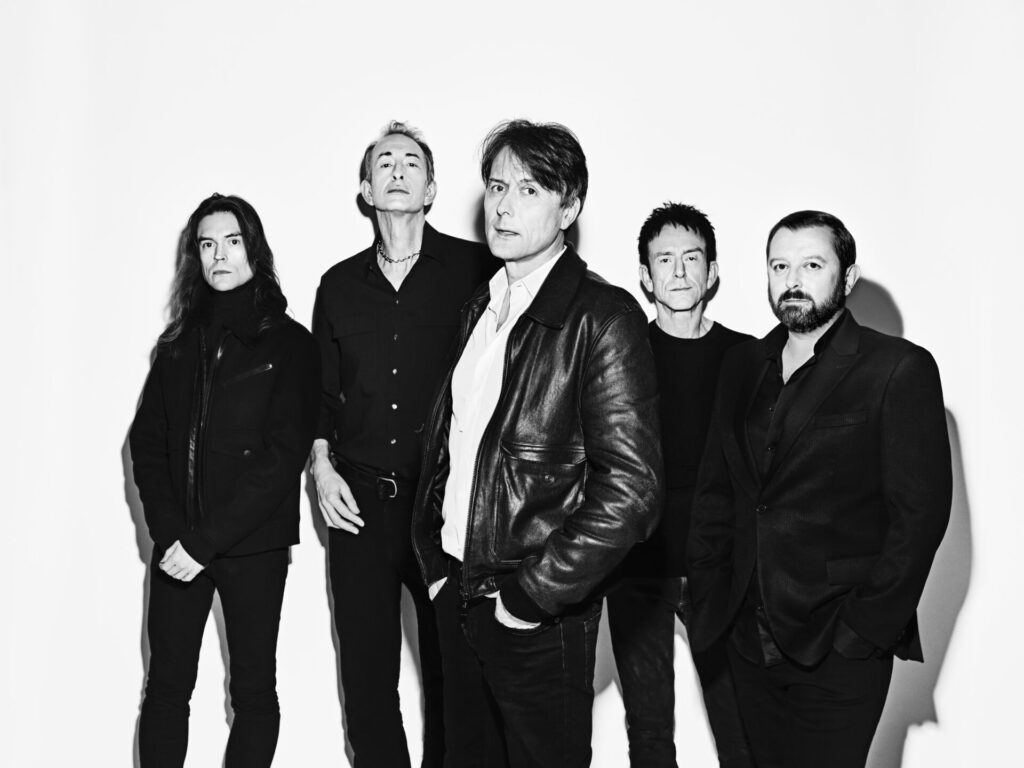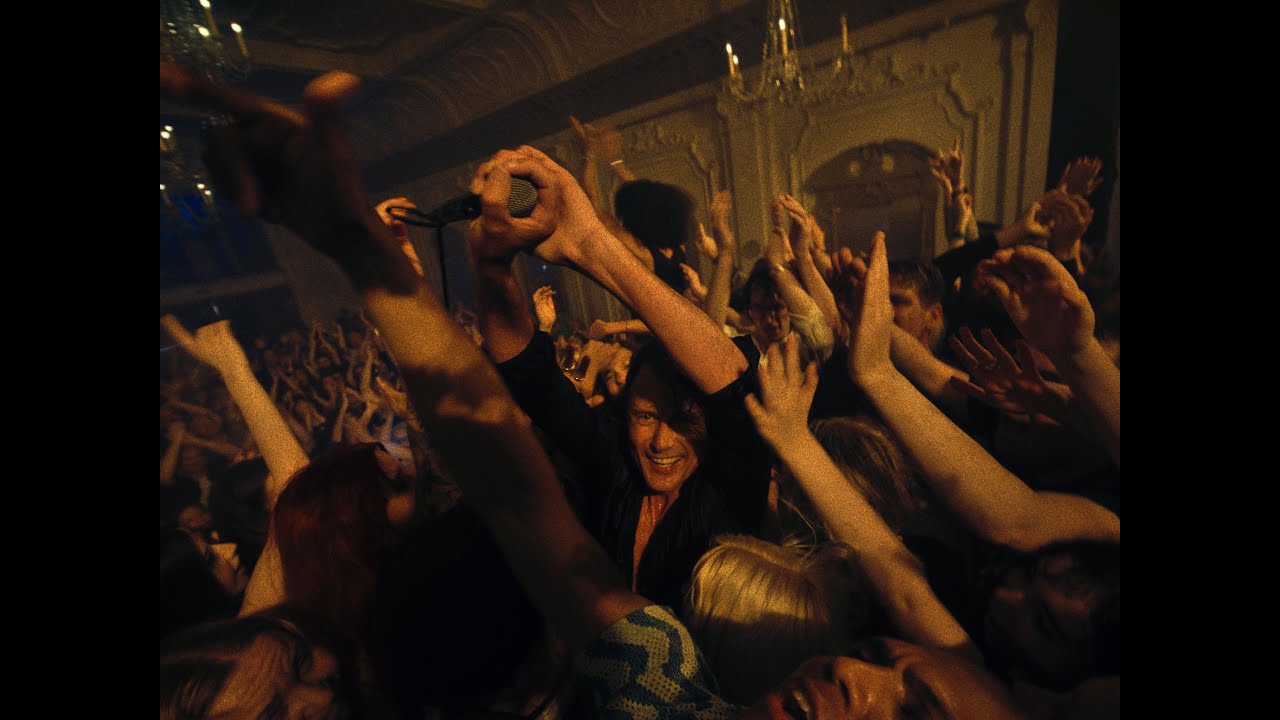In a 1966 interview with art critic David Sylvester, Francis Bacon spoke of his hopes for his paintings to extend beyond the illustrative possibilities of photographs: “One wants a [painting] to be as factual as possible and at the same time as deeply suggestive or deeply unlocking of areas of sensation other than simple illustration. Isn’t that what all art is about?”
On the cover of Suede’s tenth studio album, Antidepressants, singer and lyricist Brett Anderson assumes the position of Bacon in a 1962 photograph by John Deakin, shirtless and flanked by two cuts of meat in the position of perverse wings behind him. It’s a fitting choice for an album that deals in what Bacon termed the “exhilarated despair” of human (dis)connection, but also one which takes the raw energy of 2022’s Autofiction and skews it. If Autofiction dealt in the directness of photography, Antidepressants is – like Bacon’s portraits – a no less truthful recreation of emotion and experience through distortion and dramatisation.
This aesthetic twist begins with the first track ‘Disintegrate’, a conscious callback to Autofiction’s soaring opener ‘She Still Leads Me On’. Its melodic structure, propulsive drumbeat and Anderson’s spoken voice are all familiar, but the mood is inward-facing and existential. The vivid autobiographical descriptors of Autofiction are transformed into enigmatic phrases and metaphors, and Anderson’s delivery is knowing and theatrical, like he’s playing a semi-fictionalised version of himself. Of course Suede have always dealt in drama – from their early kitchen sink singles to 2018’s concept album The Blue Hour – but its application to the sonic honesty of their late period is an exciting progression
Ed Buller’s production on Autofiction allowed for the unfiltered noise of performance; that old Steve Albini-ism of the sound of a band in a room. There’s extraneous noise on Antidepressants, too, but here it’s edited and manipulated. At the tail ends of each song Buller includes the sound of notifications, warnings and rolling commentary in an impossibly claustrophobic squeeze. ‘Disintegrate’ begins with the sound of earphones trying to connect to a phone – a bit on the nose for a record with strong themes of societal disconnection – but on ‘Sound and the Summer’, the use of ambient noise is audacious. It’s a slice of Ballardian/Cronenbergian vehicular teasing (“You’ve never been loved till you’ve been loved in a crash”) in an unlikely anthemic guise. But the song’s real perversity comes at the very end, when a distorted but familiar British Transport Police alert can be heard in the slush of background noise. Thanks to Suede, now every time I hear “see something that doesn’t look right?” I’ll think about someone caught fucking in a train carriage.
Suede’s current renaissance is built on their reputation as a magnificent live band. Like Autofiction, Antidepressants largely continues to effectively capture that dynamism. ‘Criminal Ways’ is a fun and trashy vignette of a toxic relationship-as-crime scene (“With your fingerprints all over me / I don’t care what the evidence says”), elevated by Simon Gilbert’s thrilling rolling drums. The recording of the title track delivers on the brutality of its pre-release live performances last year, and Anderson’s half-spoken delivery retains the flamboyance and daring of his live persona. A testament to the strength of Suede’s core songwriting team of Anderson, Richard Oakes and Neil Codling, it’s up there with the band’s most direct hits, worming it’s way into your head for days like the long half-life of a pill.
Several songs share a thematic link with the synthetic happiness of antidepressants. The title track is immediate, but also cleverly constructed: the melody of the chorus bounces between a limited range of notes like emotions streamlined by medication. The New Order-esque ‘Trance State’ is a more literal take on synthesis, an impressionistic song about dissociation driven by Codling’s prominent electronics and Mat Osman’s Peter Hook-esque bass. ‘June Rain’ is a magical realist dreampop lament. Anderson describes “walking into the traffic flow”, but it’s unclear whether his protagonist is suicidal or a ghost.
Suede’s perennial Bowie influence can be found when Anderson drops into deliberately deadpan spoken delivery on ‘June Rain’. It’s also there. conceptually at least, in the broken Euro-optimism of the decent but prosaic single ‘Dancing With The Europeans’. There’s also similarities with Suede’s tour mates Manic Street Preachers – specifically their underrated late masterpiece Futurology, an anthemic expansion on the coldness and complexity of Berlin-era Bowie and early Simple Minds. ‘Broken Music for Broken People’ is in this mode. Its lyrics are fairly glib (society is divided; the titular broken music/people will “save the world”) but they’re delivered with such vim that the song still stirs. “I come alive in your arms” is a fairly quotidian line, but when Anderson drops it before pouncing into a chorus, it feels like having your heart ripped out.
The photograph of Francis Bacon quoted on the cover of Antidepressants is also something of a recreation of one of his own painted portraits, Figure With Meat. Anderson similarly places himself inside his own work on the album, taking up the persona of the Suede Song Protagonist. ‘Somewhere Between an Atom and a Star’ is not just a quintessentially Suede song title, but a tableau vivant of the band’s style for Anderson to step into: the bones of one of their classic prog-inflected ballads (‘Where the Pigs Don’t Fly’, ‘Breakdown’) performed with exaggerated extravagance. These histrionics foreshadow the album closer, ‘Life is Endless, Life is a Moment’. a shift into the funereal mode of Joy Division with some of the pomposity of classic rock ballads. Ever the prima donnas, Suede leave us with an unresolved line; an unanswered question of mortality suspended in air as the album closes.
Francis Bacon’s most important works were arguably his triptychs: sequences of portraits that allowed the artist to scrutinise the same subject or event from three connected perspectives. Suede’s career arguably begins with such a triptych: the succession of Suede, Dog Man Star and Coming Up, which examined romance, selfhood and connection as a young person with a fresh, then intensified, then fractured perspective. If Autofiction was the first entry in a new triptych, considering the same themes at a more mature stage of life, then Antidepressants is a fine middle panel: a warp of the formula that is considered and progressive, if not as immediately thrilling. What a miracle that Suede are firmly established as one of the best bands in the country, for the second time in their existence – and what a blessing that they’re using this renewed energy to keep complicating and interrogating their own artistry.




